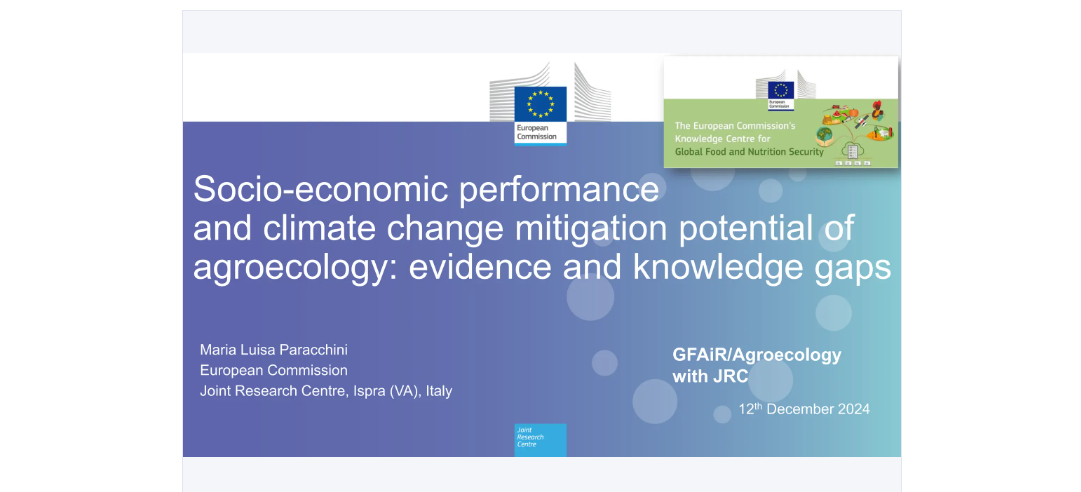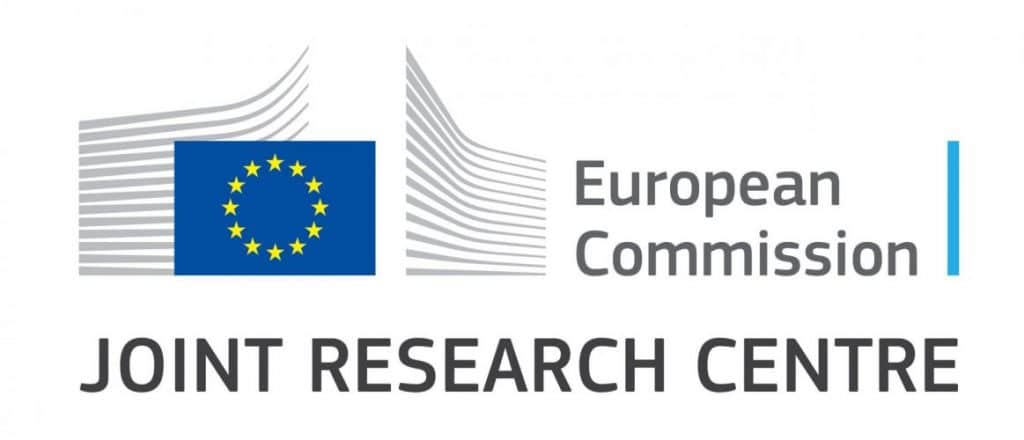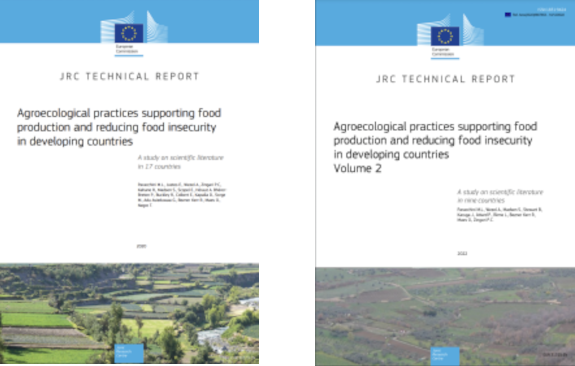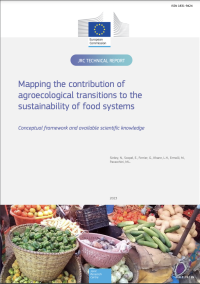
12th of December 2024 - Agroecology webinar with Maria Luisa PARACCHINI, European Commission, Joint Research Centre, Directorate D - Sustainable Resources and with Felix REMBOLD, Carlo REGA and Caroline CALLENIUS.
Commission, Joint Research Centre, Directorate D - Sustainable Resources and with Felix REMBOLD, Carlo REGA and Caroline CALLENIUS.
- Report of the meeting can be downloaded here
- Shared resource by a participant: Joint environmental and social benefits from diversified agriculture
- 439 persons registered and 125 persons attended online
The Joint Research centre’s core mission is to provide scientific evidence to European policymakers. And this includes agroecology. JRC is not engaged in primary research about agroecology. In the last three years, together with other research centres such as CIRAD but also several European universities, JRC has started several systematic scientific reviews of scientific literature and also meta-analysis.
Maria Luisa PARACCHINI presented findings from systematic reviews on the impact of
agroecology on food security, on socioeconomic performance, and food system sustainability, highlight ongoing review on climate change mitigation and adaptation. She pointed to open research questions and emphasize the need for more quantitative data.
The session highlighted the importance of agroecology in EU Development Cooperation and presented findings from studies demonstrating positive socioeconomic outcomes associated with agroecological practices compared to conventional systems. Discussions identified significant knowledge gaps, particularly concerning social capital and resilience, and emphasized the need for long-term monitoring and context-focused research. The impact of agroecology on greenhouse gas emissions and carbon sequestration was explored, alongside a Q&A session that addressed biases in existing studies and the connections between agroecology, nutrition, and health. The webinar concluded with a summary of discussions and a call for ongoing collaboration and future research directions in the field. Action items included compiling identified knowledge gaps for further exploration.
JRC Studies
1. Contribution of Agroecology to Food Security
The JRC has collaborated with CIRAD (Montpellier, FR), ISARA (Lyon, FR), and independent experts to synthesize available scientific information on social, economic, and environmental benefits of implementing agroecological practices in 26 developing countries: The main conclusions include:
- A positive contribution of agroecology to food security is reported in at least 50% of the analysed literature: improved yields, availability of more nutritious food, diversified diet, higher resilience to climate shocks, higher income. Information is mostly qualitative rather than quantitative;
- Information on agroecology at country level is limited and scattered. Most studies describe agroecological farming practices and very few analyse the economic and social aspects
- Improvement of soil fertility is a major need across the regions, and this directly links to the management of nutrients and organic matter;
This research work is organised in 2 volumes:
- Volume 1: Benin, Burkina Faso, Cuba, Ethiopia, Ghana, Guatemala, Kenya, Lao PDR, Madagascar, Malawi, Mali, Nicaragua, Niger, Senegal, Tanzania, Togo, Zimbabwe.
- Volume 2: Bolivia, Burundi, Cameroon, Colombia, Ivory Coast, Nigeria, Pakistan, The Gambia, Uganda.

To complement this scientific literature review, 10 case studies have been carried out in 10 African countries to analyse the impacts of the adoption of agroecological practices at grassroots level. The cross-analysis of these case studies reveals two major outcomes: the increase of smallholder farmers’ incomes and improved resilience to climate change.
The first reviews were specific to developing countries. 19 out of 26 are in Africa. It was an opportunity to characterize what agroecological practices are being implemented. There is a clear positive impact of agricultural practices on food security. It's not only through yield and production, but it's also very clearly in terms of increased availability of nutritious food and dietary diversity (the link
between food security and health).
2. Contribution of Agroecology to Sustainable Food Systems
The broader contribution of agroecology to sustainable food systems is explored in this study. The analysis highlights linkages and potential win-win contribution of agroecology in several food system sustainability dimensions, but empirical studies are still limited.
There is less literature on the agroecology- food nexus available. JRC
compared the principles of agroecology with the food systems framework and food systems sustainability dimensions. Most evidence is there on the agro-biodiversity- food security/nutrition nexus. Increased biodiversity has a positive impact on food systems resilience
3. The Socio-economic Performance of Agroecology
This research demonstrates that agroecological practices at the farm level positively impact socio-economic factors, such as increased incomes, higher revenues, enhanced productivity, and improved efficiency.
In 80 peer reviewed papers scientific JRC found clear positive association with farmers income, with revenue and also with efficiency and productivity. But, agroecology is also labor intensive and can increase costs. It is always a question of trade offs and cost benefit. It is important to look very specifically at local context to understand whether the overall effect on income prevails on the increase of costs or on pressure, for example on gender inequality that can be linked to the increase of labor need.
4. Can Agroecology Support Sustainable Development in Africa?
The article is coming forth soon in the Journal Agronomy for Sustainable Development.
The study shows that agroecological practices can provide positive social, economic and environmental outcomes across all agro-climatic zones in African countries with high food insecurity. One-third of articles reported benefits to food security, incomes and economic growth, and the environment. 96% of the publications report positive impacts on economic outcomes, in particular on agricultural income or production costs.
5. Agroecologcial Practices for Climate Change Mitigation and Adaptation
Study coming forth soon.
Climate change mitigation. JRC is currently close to finalizing a review of 16,000 scientific papers about the potential of agroecology in terms of climate change mitigation and adaptation. There is strong evidence that agroecology has a potential to reduce greenhouse gas emissions in particular CO2 and N2O thanks to the reduced carbon intensive inputs and thanks to the use of less fossil-based fertilizers. From the 16,000 papers 300 papers have full text contributions and some have quantitative data. There is scientific evidence about the fact that the agricultural practices can clearly and strongly increase the carbon stocks in the soil through the various practices from mulching to practices that increase organic material in the soil and agroforestry which clearly contributes to Carbon Sequestration. Rice producing
systems are contributing very strongly to methane. Methane can be reduced by different agroecological practices. The same applies also to livestock.
Climate change adaptation. There is a strong body of evidence that some aspects or some practices in
agroecology and in particular diversification at the farm level have a strong potential to contribute to climate change adaptation. Increased biodiversity can support resistance to drought or drought tolerance.
Case Studies
- Cameroon – Agroforestry - Cooperative learning and participatory tree selection and propagation. "Due to farmers’ cultural affinity for agroforestry practices, agroforestry has become the most popular method that farmers use to alleviate the effects of land degradation, climate change, and hunger in rural areas."
- Ethiopia – Silvopasture - Spreading silvopastural system through farmer exchanges. "Goats feed on Ficus thonningii leaves harvested from silvopastoral systems; Its drought tolerance has reduced the water requirements for livestock fodder production by 85%, a critical improvement in such an arid climate."
- Kenya – Push-pull technology - Farmer-to-farmer exchanges and field schools to spread push-pull throughout Kenya, Uganda, Tanzania. Scientists, together with thousands of Kenyan smallholder farmers, experimented with different approaches to perfect a new low-cost technique of agroecological pest management: push-pull.
- Madagascar - Crop diversification (varietal mixtures), crop fertilization (improved manure) -Participatory evaluation of rainfed rice varieties and improved manure. The introduction of locally-adapted rice varieties lowered production costs and the risks of crop failure due to climate or disease. As a result, rice production has become more accessible to farmers of varying altitude and socio-economic positions.
- Malawi - Crop diversification, organic fertilization, legume intercropping, plant-based pesticides. Participatory approach to spread agroecological practices. A participatory approach helped to revalue and share existing agricultural knowledge in farming communities, while encouraging farmer experimentation facilitates the adaption of practices to future social and environmental conditions.
- Niger - Improved fertilization (wood ash and manure), seed balls, crop diversification, legume intercropping, tree planting, crop-tree-livestock. - Supporting agroecological innovation through participatory research and knowledge and seed dissemination. Gender inequity is addressed through equal representation in membership (women make up 52% of FUMA Gaskiya), and targeted participation in research programmes and experimentation. Women notably played an essential role in selecting a millet variety with high potential for pest and drought resistance.
- Nigeria - Crop rotation, mulching and composting, tree-crop integration, crop diversification - Revitalizing farmer livelihoods through agroecological management of farms and forests. Reforestation efforts with indigenous species improved the local availability of forest products while agroecological farming approaches, applied in combination with improved seed varieties and drip irrigation technology, successfully increased incomes from vegetable production.
- Tanzania - Legume intercropping, livestock and fish farming integration, beekeeping, tree planting, contour ridges and bunds - A village territory approach based on a large number of principles of agroecology. The project also trained farmers in fish production, further increasing farm-level diversity. Beekeeping and tree planting enhanced biodiversity at the landscape level, increasing both pollinating services and habitat for wild flora and fauna
- Uganda – Coffee-Banana Intercropping - A traditional approach to diversified farming. After integrating bananas into coffee fields, women were more motivated to work in the fields, as bananas can be used for household consumption.
- Zimbabwe - Improved crop rotations, companion planting, intercropping, cover crops and composting, integrated pest management, livestock integration - The process of building agroecological markets to support farmer livelihoods. More farmers sought and received training on agroecological practices and marketing, and formed associations to produce organic horticultural products, certified through the Participatory Guarantee Scheme.
Challenges
- One of the challenges with the scientific reviews was to consider practices which are not named as Agroecology. Another challenge throughout all these reviews is that many research papers work on single practices. So the complexity and the systemic aspects are very difficult to evaluate.
- Policymakers need not only conclusions about the potential and whether the associated impact of agricultural practices is positive or neutral or negative. They need also more quantitative data. JRC started working on and as well as other research centres.
- There is a need for more modelling to also provide quantitative information, possibly in local contexts and not just globally.
- A lot of research is focused on the farm and on production aspects and not on the other parts of the food system. There is clearly a research gap. The identification of research gaps is the second benefit of the literature review, after identifying the main comparative advantages of agroecology with conventional agriculture. This is also something JRC is discussing with the colleagues of RUFORUM, FARA and others: to identify the research gaps so that new initiatives can focus on those gaps.
